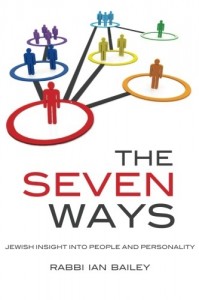Nitzavim: Less is More; Anatomy of an Indulgence
For young Rabbi Shaya Kohn, dealing with drugs addicts and dropouts was a daily drama for over eight years. Kohn, who now helps young men earn GEDs at an alternative Jewish school, is a caring, energetic rabbi of medium hight and build, with a thick, bristly beard, and a perpetual smile spread wide on his face. When you meet him, R’ Kohn makes you feel good about yourself. He can’t help but look you in the eye and tell you warm compliments.
feel good about yourself. He can’t help but look you in the eye and tell you warm compliments.
 The young spiritual leader specializes in helping youth who need extra attention or do not fit into the standard mold of the educational system. Over the years, he has helped delinquent boys come together to construct farms and raise animals, Ukrainian Jews to reclaim their heritage, and young high school boys stay clean and don their cap and gown on graduation day. He is a hod-type par excellence, reminiscent of Chaim Miller in The Seven Ways (2011).
Much of R’ Kohn’s success is based on an incredible psychological insight that is found in the words of Nachmanides (Ramban), on a sentence in this week’s Torah Portion. A very cryptic sentence reads:
The young spiritual leader specializes in helping youth who need extra attention or do not fit into the standard mold of the educational system. Over the years, he has helped delinquent boys come together to construct farms and raise animals, Ukrainian Jews to reclaim their heritage, and young high school boys stay clean and don their cap and gown on graduation day. He is a hod-type par excellence, reminiscent of Chaim Miller in The Seven Ways (2011).
Much of R’ Kohn’s success is based on an incredible psychological insight that is found in the words of Nachmanides (Ramban), on a sentence in this week’s Torah Portion. A very cryptic sentence reads:
“…I will go through life as I see fit, so as to place the fullness (ha’rava) with thirst” (Deut. 29:18)
The Hebrew wording at the end of this sentence is extremely difficult to read. In Ramban’s commentary to this verse, which was poignantly shown to me by R’ Kohn, the great sage finds a fundamental and profound psychological insight. Nachmanides’ words read: “The explanation of [this sentence is]… to join together someone who is feeling full in his or her physical desires with someone who is desirous (i.e., to further attempt to satiate someone who has already achieved satiation). The reason for this [being out of the ordinary] is that someone who is full does not have a strong desire for items that are bad for him or her (- including items of excess). “When it should happen that a little desire enters someone [after satiation], and this person fulfills his or her new desire, then this person’s desire [actually] increases [to a new threshold of achieving satiation] and he or she ‘thirsts’ exceedingly for that item that he or she ate or did more than initially (‘did’ here means non-food indulgences). Then the person will desire more bad things that were not desired initially.” Ramban explains that, when someone decides to indulge in attractive, self-gratifying pleasures, his illicit indulgence will eventually lead to more and still more perverted and depraved ways of fulfilling his lusts and desires, beyond the original intention(1). He extrapolates this to any indulgence, as “[t]he same occurs with other desires; it is in line with the concept that our sages mention (Suka 52b), ‘When it is satiated, it is hungry; when it is starved, it is satiated.’”
Nachmanides teaches that the more we give in to a small extra indulgence, the more our bodies and imaginations tell us that we needeven more indulgence after that! The mentality “just a little more” will lead to wanting even more yet – with no satiation in sight.
line with the concept that our sages mention (Suka 52b), ‘When it is satiated, it is hungry; when it is starved, it is satiated.’”
Nachmanides teaches that the more we give in to a small extra indulgence, the more our bodies and imaginations tell us that we needeven more indulgence after that! The mentality “just a little more” will lead to wanting even more yet – with no satiation in sight.
To learn more about actualizing yourself read The Seven Ways
It is important to note that Ramban is not teaching us to continually lessen our engaging in pleasurable acts to the point that we are starving our physical bodies from anything enjoyable; this would be contradictory to the beginning of his piece, where he comments that one can be satisfied with basic, ‘good’ activities that are pleasurable to the senses (as opposed to the word ‘ra’ ‘bad’ that he uses). Rabbi Kohn used the psychology behind the Ramban’s words for many years to assist youths to develop out of their issues. Many people whom he has worked with have reached the point of not being emotionally healthy and/or functional members of society due to our very issue of indulgence. At one point in time, the youths, many of whom now have addictions and dependencies, decided to indulge, and progressively continued to engage in more indulgent and unhealthy behavior until their actions were far beyond what their intentions were in the first place. Many admitted to being extremely unhappy with their own behavior, but could not resist giving in to their urges. R’ Kohn’s work with them included lessening the need for desire(2) through practicing progressively less indulgence over time, as well as involving them in constructive building projects and the act of giving to people and animals in need. Other methods were used, which I hope to share in another post, but the main battle is lessening or replacing the compulsion to indulge. It is very clear that a different message about indulgence is being purported by the media and pervading culture around us. Television, movies, and many websites on the Internet give us messages that we must give in to indulgence to satisfy our unquenchable urges. Aside from the observable prevalence of advertisements to indulge, this encouragement is found in a very subtle but very profound dynamic between characters in visual presentations and written stories. The message is that we all have serious desires and will only be satiated when those desires are fulfilled. “I feel so much better now!” the character says, after giving in. A character is portrayed as needing a hit (of food, drug, etc.), with the overtone being that the intense desire that cannot be overcome; that self-restraint – gevurah – is unachievable.
Internet give us messages that we must give in to indulgence to satisfy our unquenchable urges. Aside from the observable prevalence of advertisements to indulge, this encouragement is found in a very subtle but very profound dynamic between characters in visual presentations and written stories. The message is that we all have serious desires and will only be satiated when those desires are fulfilled. “I feel so much better now!” the character says, after giving in. A character is portrayed as needing a hit (of food, drug, etc.), with the overtone being that the intense desire that cannot be overcome; that self-restraint – gevurah – is unachievable.
For a list of the different skill sets in the personality system I developed click here
The Ramban and Torah psychology clearly teach to the contrary. By limiting one’s enjoyment to ‘good’ healthy levels, one will be continually satiated and happy, and not need to constantly increase her or his indulgence to meet the body’s demands. With only periodic visits of slight enticement from the Evil Inclination, once can easily deflect the urge to indulge “just a little more” and find real satiation and serenity. –IB Addendum: I once stumbled upon a book that utilizes our psychological principal. The Life Transforming Diet (2007) is based on insights and advice of the Rambam (Maimonides), baalei mussar ( people who advice on ethical behavior and psychological development) and contemporary medical advice (often the same thing as Rambam’s advice). One of the essential principles in this book is that one can be physically satisfied with the basic amount of food that one’s body needs. Not surprisingly but much to our dismay, the amount of food we actually need is far, far less than we typically eat. I did this diet for about two months and actually ate the basic amount of food and snacks advised. I never felt hungry in a way that made me suffer or feel deprived. I did not usually even feel hunger. I hope to readopt the practices again soon, especially after the words of the Ramban. Once again, what the Torah recommends is the best solution.
When it comes to eating healthier, many people are very concerned with feeling hungry and deprived. They feel that “Healthy food just doesn’t taste good!” or “Just doesn’t fill me up.” What new meaning these complaints have! One need not necessarily eat the type of health food that is bland and has bad texture, but one should remember that less is more; that gradually eating less will squelch the appetite, not entice it. (Rambam even recommends only eating until ones stomach is ¾ full, perhaps this is one of the reasons.) One can be truly satisfied with basic amounts of permitted pleasures.
Endnotes
(1) See the actual wording of the Ramban, he is quite graphic.
(2) Please note that I acknowledge that there are other issues such as addiction and abuse that also cause people to indulge – the issue is not simple. I am focusing on one topic at a time. The methods mentioned in this sentence are behavioral and meant to be in contradistinction to our indulgence issue.
Bibliography
Bailey, I. (2011). The Seven Ways. Baltimore: Createspace.
Zulberg, D.J. (2007). The Life Transforming Diet. New York: Feldheim.
Not surprisingly but much to our dismay, the amount of food we actually need is far, far less than we typically eat. I did this diet for about two months and actually ate the basic amount of food and snacks advised. I never felt hungry in a way that made me suffer or feel deprived. I did not usually even feel hunger. I hope to readopt the practices again soon, especially after the words of the Ramban. Once again, what the Torah recommends is the best solution.
When it comes to eating healthier, many people are very concerned with feeling hungry and deprived. They feel that “Healthy food just doesn’t taste good!” or “Just doesn’t fill me up.” What new meaning these complaints have! One need not necessarily eat the type of health food that is bland and has bad texture, but one should remember that less is more; that gradually eating less will squelch the appetite, not entice it. (Rambam even recommends only eating until ones stomach is ¾ full, perhaps this is one of the reasons.) One can be truly satisfied with basic amounts of permitted pleasures.
Endnotes
(1) See the actual wording of the Ramban, he is quite graphic.
(2) Please note that I acknowledge that there are other issues such as addiction and abuse that also cause people to indulge – the issue is not simple. I am focusing on one topic at a time. The methods mentioned in this sentence are behavioral and meant to be in contradistinction to our indulgence issue.
Bibliography
Bailey, I. (2011). The Seven Ways. Baltimore: Createspace.
Zulberg, D.J. (2007). The Life Transforming Diet. New York: Feldheim. 